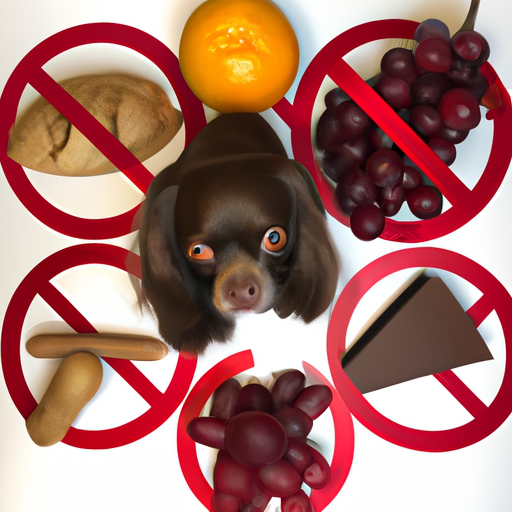As caregivers to our beloved canine companions, it’s crucial that we know what can and cannot go into their bowls and mouths. While we might be tempted to share our favorite human foods with our pets, not all are safe for them. Some foods can even be deadly. This article will cover the foods you should never give your dog and why they can be harmful.
Table of Contents
Key Takeaways
- Not all human foods are safe for dogs.
- Some foods can cause minor health issues, while others can be deadly.
- Always consult with a veterinarian if you’re unsure about feeding certain foods to your dog.
The Danger of Human Foods
While dogs are primarily carnivorous, they are also known to be opportunistic eaters. This means that they’ll often eat anything that’s edible, making them prone to consuming foods that might not be good for their health. It’s important to remember that just because a food is safe for humans doesn’t mean it’s safe for dogs. Many human foods contain chemicals and compounds that can be harmful to dogs.
For an in-depth look at the differences between human and dog diets, you can check out this article on OneTopDog.
Foods to Avoid
Here are some of the most common foods that are harmful to dogs:
- Chocolate: Chocolate contains theobromine, a compound that’s toxic to dogs. Ingesting chocolate can lead to vomiting, diarrhea, irregular heart rhythms, seizures, and even death.
- Grapes and Raisins: These fruits can cause kidney failure in dogs. Even small amounts can be deadly.
- Onions, Garlic, and Chives: These foods can cause gastrointestinal irritation and could lead to red blood cell damage in dogs.
- Xylitol: This artificial sweetener, found in many sugar-free foods, can cause insulin release, which can lead to liver failure.
- Alcohol: Alcohol can cause vomiting, diarrhea, decreased coordination, central nervous system depression, difficulty breathing, tremors, abnormal blood acidity, coma and even death in dogs.
OneTopDog has a comprehensive list of foods that are toxic to dogs that you may want to bookmark for easy reference.
Potentially Dangerous Foods
While the above foods are known to be toxic to dogs, there are also foods that are potentially dangerous and should be avoided or given with caution. These include:
- Dairy Products: Many dogs are lactose intolerant, which means they can’t digest lactose in milk and other dairy products. Consumption can lead to digestive issues like diarrhea and vomiting.
- Coffee and Caffeine: These can cause restlessness, rapid breathing, heart palpitations, muscle tremors, and seizures in dogs.
- Bones: While it might seem natural to give a dog a bone, they can actually be quite dangerous. Bones can splinter and cause choking or serious damage to the dog’s mouth, throat, or intestines.
For a more complete list of potentially harmful foods, you can check out this page on OneTopDog.
Frequently Asked Questions
Q: Can dogs eat peanut butter?
A: Yes, but make sure it doesn’t contain the sweetener xylitol, which is toxic to dogs.
Q: Is it okay for dogs to eat cheese?
A: In small to moderate amounts, cheese can be safely given to dogs. However, some dogs may be lactose intolerant, so monitor for any signs of digestive upset after feeding cheese.
Q: Are apples safe for dogs?
A: Yes, dogs can eat apples. Just make sure to remove the seeds and core as they can be a choking hazard.
In conclusion, it’s important to be aware of the foods that can be harmful to your dog. Always consult with your veterinarian if you’re unsure about feeding certain foods to your dog. For more information on dog health and nutrition, visit OneTopDog.



